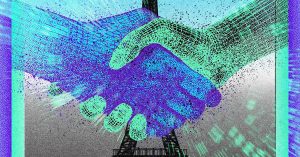ABBA member Björn Ulvaeus is among a group of musicians that will “help inform YouTube’s approach to generative AI in music”.
Dubbed the YouTube AI Music Incubator, the program includes a wide range of artists, including the ABBA star, Brazilian singer Anitta, singer d4vd and several others. Artists seemingly don’t even need to be alive to help YouTube get to grips with AI—the estate of Frank Sinatra is among the list of contributors.
Given Björn Ulvaeus was best known for his work in the 1970s, he might also seem an unlikely choice to help YouTube with its AI work, although ABBA are certainly no dinosaurs when it comes to music technology. The ABBA Voyage show which opened in London last year creates convincing holographic avatars of the band which perform on stage for a 90-minute concert.
“While some may find my decision controversial, I’ve joined this group with an open mind and purely out of curiosity about how an AI model works and what it could be capable of in a creative process,” said Ulvaeus in a statement.
“I believe that the more I understand, the better equipped I’ll be to advocate for and to help protect the rights of my fellow human creators.”
Other artists share Ulvaeus’s intention to protect the work of human artists from AI. “We have to be in this conversation, or our voices won’t be heard,” said composer Max Richter, another member of the Incubator.
“Therefore, I’m very happy to be part of the ‘artist incubator’ which will allow me to advocate for the interests of the creative community in the applications of AI to music and music distribution.”
YouTube’s AI Principles
Alongside the Incubator, YouTube has published a set of three AI music principles, which the company’s CEO claims demonstrates the service’s commitment to work with the music industry.
The first principle states that “AI is here, and we will embrace it responsibly together with our music partners”.
The second claims that “AI is ushering in a new age of creative expression, but it must include appropriate protections and unlock opportunities for music partners who decide to participate”.
While the third principle asserts that YouTube has already “built an industry-leading trust and safety organization and content policies”, and that it “will scale those to meet the challenges of AI”.
The somewhat defensive principles are clearly designed to show that YouTube is listening to the concerns of the music industry, which is growing increasingly worried about the impact of AI-generated content being shared on social media services.
YouTube acknowledges that “generative AI systems may amplify current challenges like trademark and copyright abuse, misinformation, spam, and more,” but also says there’s scope for AI to work on the behalf of the rights holders too.
“AI can also be used to identify this sort of content, and we’ll continue to invest in the AI-powered technology that helps us protect our community of viewers, creators, artists and songwriters–from Content ID to policies and detection and enforcement systems that keep our platform safe behind the scenes,” the company said in a press statement.
Read the full article here








